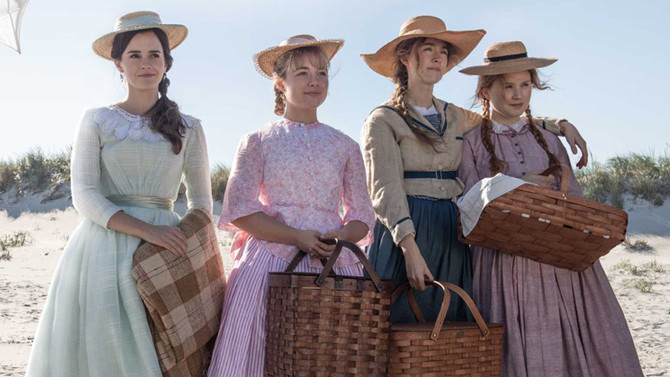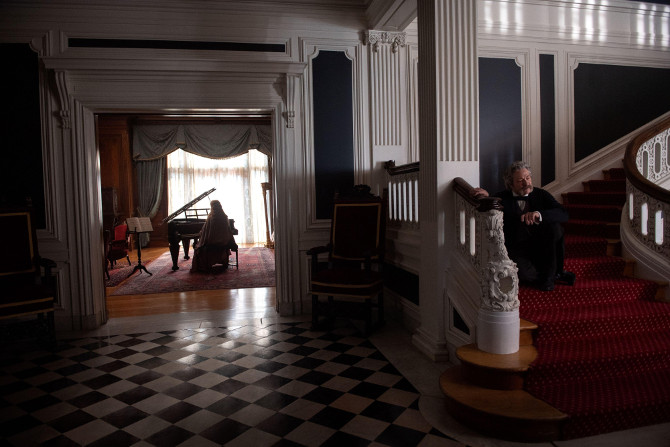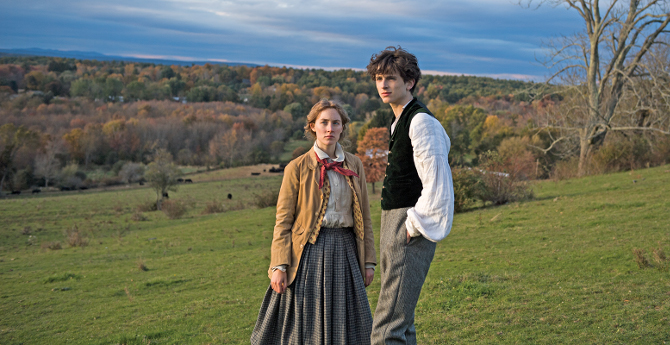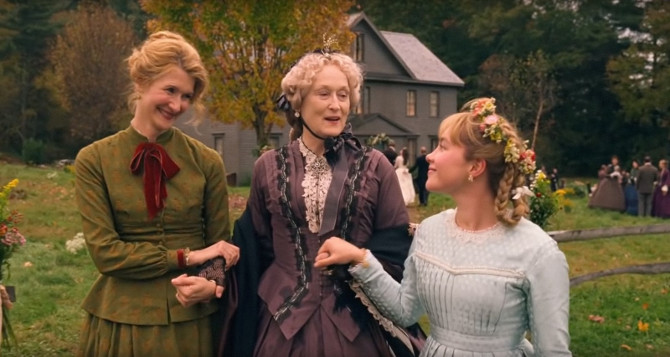You just can’t beat a good idea. . . which is why most iconic stories have found their way onto the silver screen more than once – case in point, Little Women. Reuniting the director/actor dream team of Greta Gerwig and Saoirse Ronan just two short years after their success with Lady Bird, this 2019 effort follows adaptations released in 1917, 1918, 1933, 1949, 1994 and a 2018 tv movie (and no less than eight television versions) – I’ll leave it up to you as to what that proves (perhaps that classics are eternal. . . or maybe, that Hollywood can no longer muster up even one original idea).
Gerwig, adapting one of her favourite novels (written by Louisa May Alcott), creates a visually striking world, from its perfectly framed opening shot to its closing scenes, the lush, New England landscape a brilliant backdrop for this nineteenth century tale. Each home, architectural flourish, costume choice, and colour selection painting a nuanced, impressionist piece of artwork.
Following Jo March (Saoirse Ronan), and, through her, her sisters, she is a strong-willed writer trying to make her way in a man’s world (leaving her family home and moving to New York City). Surrounded by talented actress Meg (Emma Watson) – too prim and proper to actually try her hand at it professionally, artistically driven Amy (Florence Pugh), and musically inclined Beth (Eliza Scanlen), they struggle to survive while their father (played somewhat unexpectedly by Bob Odenkirk) is off at war, and mother, Marmee (Laura Dern), is more focussed on her charitable efforts than family finances. Together, they are a unified front. . . a bond closer than blood, thicker than thieves, and heartwarming to watch. Meanwhile, their wise-cracking, wealthy, and slightly difficult to love Aunt March (Meryl Streep), who still begrudges her brother’s poor choice of impoverished mate, is likely looking to take one of her young nieces to Paris with her on a lengthy trip.
Though by no means dirt poor, their situation is nowhere near as comfortable a lifestyle as the wealthy Laurence family (who live across the way), run by patriarch Mr. Laurence (Chris Cooper), who cares for his lively grandson ‘Laurie’ (Timothée Chalamet).
Told in a most unique way (that may not be to the liking of some viewers – though I found it quite effective), I almost compare it to the distorted memory of someone who has dementia. Stick with me here: the narrative rarely spends any time in the present. . . Jo’s memory lengthily lingering in the past as she reflects on the lives of the March family. Her current situation, though perhaps important, forces her back into the recesses of her days of yore at the family home in Massachusetts. Not so much about a driven plot, this is a story of her past influencing her present.
In these reminiscences, we learn of her unusual bond with ‘Laurie’, her power over him almost likes a man’s, while we further understand the nuances of the other sisters. Much of their conversations revolve around money, not only their drive to survive, but flourish – something not easily done in a nineteenth century mans’ world. Jo and Amy are especially goal-oriented towards their talents (hoping that they can turn their artistic creativity into money), while Meg and Beth are perhaps a bit more aligned with their parents’ idealistic, love and community driven perspective.
Jo, despite having Laurie wrapped around her finger, is arguably the hardest to love. Stubborn, single-minded and unwavering, her man-like drive may help her in some respects, but also keeps people at arm’s length. . . including puppy dog Laurie. Out of it comes both important life questions and a crippling loneliness, Jo slowly becoming unsure of whether her bold path in life is the right choice. . . or even a manageable one. Likewise, self-doubt creeps into her mind about her writing. . . can the book she is trying to develop really be published in this unsupportive world?
A quality piece of film making, this 2019 version of Little Women does things right. Combining superlative direction and beautiful visuals with stellar performances (expect to see Ronan win an Academy Award in the somewhat near future – with already four noms, she has had a quality chance three of the last six years), Gerwig, in only her second directorial effort, is proving that she will be a force to reckon with in years to come. A final humourous note finds none of the four March sisters being played by Americans. . . ironic for such an iconic piece of American material. So, discover if Jo’s book is bound to her life in this reworking of a classic American novel.




